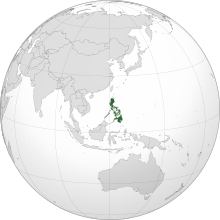
Back معاملة المثليين في الفلبين Arabic LGBT práva na Filipínách Czech Homosexualität auf den Philippinen German Diversidad sexual en Filipinas Spanish Droits LGBT aux Philippines French זכויות להט"ב בפיליפינים HE Hak LGBT di Filipina ID Diritti LGBT nelle Filippine Italian フィリピンにおけるLGBTの権利 Japanese Perkahwinan sama-jantina di Filipina Malay
This article may contain an excessive amount of intricate detail that may interest only a particular audience. (July 2021) |
LGBT rights in the Philippines | |
|---|---|
 Philippines | |
| Status | Legal |
| Gender identity | Transgender people are not allowed to change legal gender |
| Military | Gay, lesbian, bisexual and transgender people allowed to serve openly since 2009; Some restrictions on gender expression based on legal gender (ie. uniform) |
| Discrimination protections | None at the national level, but many anti-discrimination ordinances exist at the local government level in some parts of the country |
| Family rights | |
| Recognition of relationships | None; same-sex civil union bills pending[1][2] |
| Restrictions | No constitutional prohibition but the Family Code of the Philippines defined marriage as "a permanent special contract union between a man and a woman".[3] |
| Adoption | Single individuals are allowed regardless of sexual orientation, but not for same-sex couples. Single LGBT adopters may sometimes be refused to adopt as unfit under "good moral character" criteria.[4] |
| Part of a series on |
| LGBT rights |
|---|
 |
| Lesbian ∙ Gay ∙ Bisexual ∙ Transgender |
|
|
Lesbian, gay, bisexual and transgender people (LGBT) in the Philippines face legal challenges not faced by non-LGBT people, with numerous anti-discrimination legislations, bills and laws that are struggling to be passed on a national level to protect LGBT rights nationwide, with some parts of the country only existing on a local government level. LGBT individuals in the Philippines are often faced with disadvantages and difficulties in acquiring equal rights within the country. They also have a higher rate of suicide and suicide ideation compared to their heterosexual counterparts.[5][6]
Many bills for LGBT rights have been proposed since, including an anti-discrimination bill, which has been debated since 2000.[7] Despite failing to pass in the national government, many anti-discrimination ordinances exist at a local government level in eight provinces and various cities in the Philippines, including the capital Manila,[8] and major cities such as Iloilo City, Cebu City,[9] and Davao City.[10]
Meanwhile, an anti-bullying law exists, which includes sexual orientation and gender identity as some of its prohibited grounds.[11]
In 2022, two civil union bills have been refiled and proposed in Philippine Congress; both of which seek to recognize, provide benefits and protection for same-sex couples in the Philippines.[12][13]
As a member of the United Nations, the Philippines is signatory to various international covenants promoting human rights including LGBT rights.[14]
Alongside these developments, LGBT movements in the Philippines have been very active and gained some political representation.[15][16]
- ^ "Padilla seeks to institutionalize same-sex union". Inquirer. Retrieved August 23, 2022.
- ^ "Civil partnerships for straight, same-sex couples pushed anew in House". The Philippine Star. Retrieved August 23, 2022.
- ^ "CBCP exec: US should respect PHL law regarding same-sex marriage". GMA News. Retrieved April 6, 2014.
- ^ Abrenica, Jessica; Asuncion, Amabelle; Katigbak, Mona Francesca (June 2001). "Beyond Malakas and Maganda: Re-welcoming the Baybayan into the Filipino Family" (PDF). Philippine Law Journal. Archived from the original (PDF) on June 11, 2016. Retrieved April 24, 2016.
- ^ Suicide Ideaton and Suicide Attempt Among Young Lesbian and Bisexual Filipina Women:Evidence for Disparities in the Philippines by Eric Julian Manalastas
- ^ "Suicide Ideation and Suicide Attempt Among Young Lesbian and Bisexual Filipina Women: Evidence for Disparities in the Philippines". Researchgate.net.
- ^ "TIMELINE: SOGIE equality in the Philippines". RAPPLER. August 28, 2019. Retrieved August 27, 2022.
- ^ Cite error: The named reference
:1was invoked but never defined (see the help page). - ^ Cite error: The named reference
:10was invoked but never defined (see the help page). - ^ Cite error: The named reference
:11was invoked but never defined (see the help page). - ^ Cite error: The named reference
:12was invoked but never defined (see the help page). - ^ Cite error: The named reference
:13was invoked but never defined (see the help page). - ^ Cite error: The named reference
:14was invoked but never defined (see the help page). - ^ UNDP, USAID. Being LGBT in Asia: the Philippines Country Report. (Bangkok: USAID, 2014)
- ^ Cite error: The named reference
firstwas invoked but never defined (see the help page). - ^ Cite error: The named reference
:18was invoked but never defined (see the help page).
© MMXXIII Rich X Search. We shall prevail. All rights reserved. Rich X Search